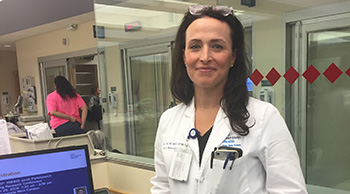-
Services
Featured Specialties
-
Locations
Location Type
-
Patients & Visitors

Eleanor Reid, MD, Emergency Department, helped save the life of a fellow runner at a recent 5K.
Eleanor Reid, MD, doesn’t run in many events, but on Feb. 4, she joined more than 2,000 other participants in the Integrated Refugee and Immigrant Services (IRIS) Run for Refugees in New Haven.
She could have been anywhere in the throng of runners, but happened to be nearby when, during the first mile of the run, she heard an urgent shout, “We need a doctor!”
Reid, a physician in Yale New Haven Hospital’s Emergency Department and clinical instructor in Yale School of Medicine’s Department of Emergency Medicine, rushed over to find a collapsed male runner who was not breathing and had no pulse. Reid and two other runners, who were nurses, began CPR.
Unbeknownst to him, the man had a heart defect, a bicuspid aortic valve, which caused his aortic valve to narrow at an early age. Called aortic stenosis, the narrowing prevents the valve from opening fully, which reduces or almost completely blocks blood flow from the heart to the aorta and the rest of the body. Reid and the nurses performed CPR for five to seven minutes, all the time saying the man’s name, Scott, which they had gotten off his race number bib. “All of a sudden his eyes opened and he kept saying ‘hello,’ as if he couldn’t see or hear anything. Then he started talking to us,” Reid recalled. “By the time the ambulance arrived, he was able to walk into it.”
Scott was brought to the YNHH ED, where Reid met him and told the ED care team what had happened. He was hospitalized, and on Feb. 9, had successful valve replacement surgery.
“Simply put, Eleanor saved my life on February 4th,” Scott said. “Gratitude is simply not enough. My family and I are blessed.”
He is also grateful for the care he received during his hospitalization, and to Arnar Geirsson, MD, chief of Cardiac Surgery, who performed minimally invasive valve replacement surgery, through a small incision on the upper part of Scott’s chest.
“From the outstanding nursing team to the incredible cardiologists and diagnostic testing, I had the type of care not accessible to all,” Scott said. Reid was able to visit Scott and his family in the hospital before his surgery.
“Getting to see him again and meet his family was incredible,” she said. “Sometimes we’re not aware of the personal impact we have on people’s lives. This was very, very rewarding.”